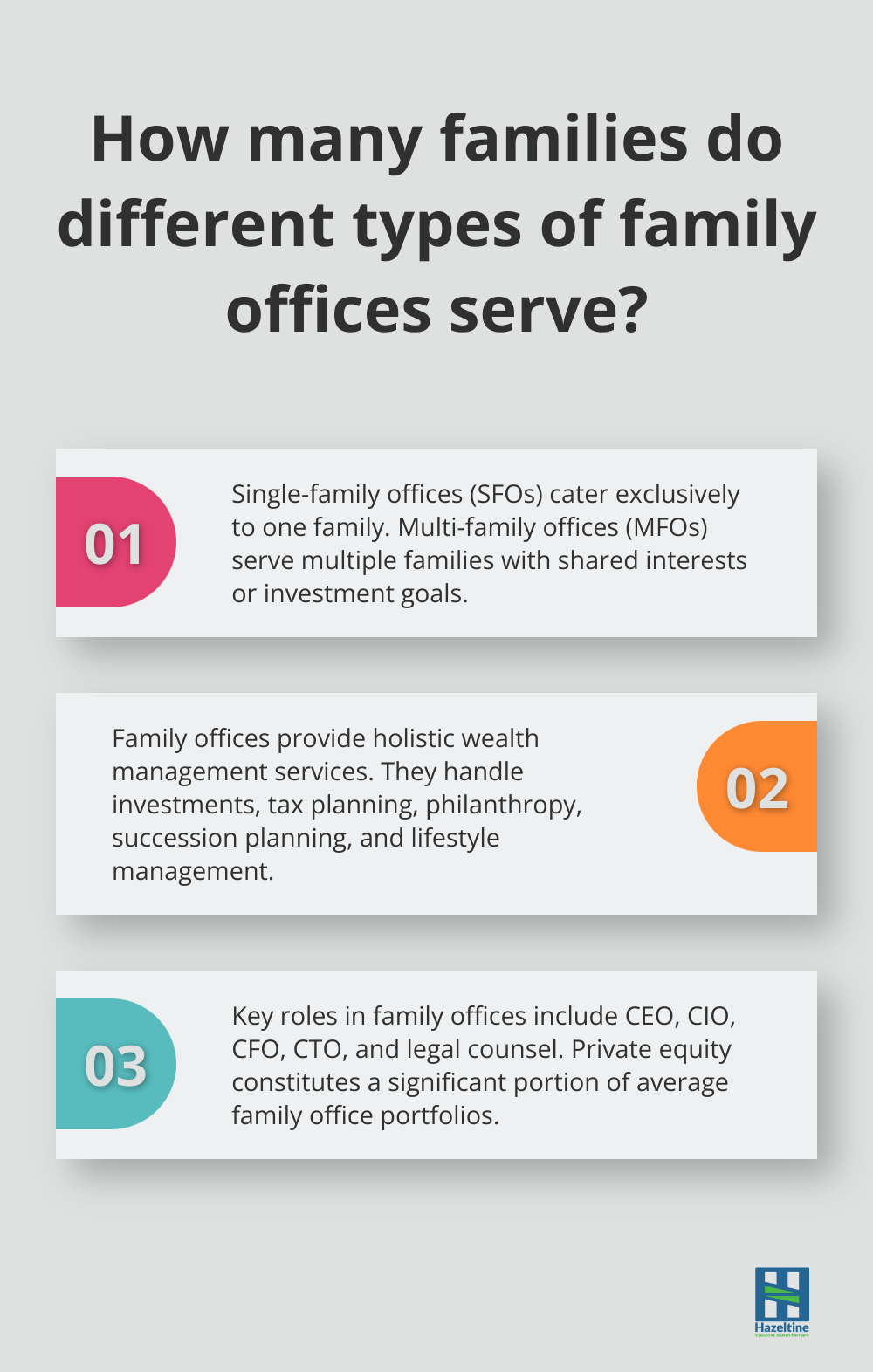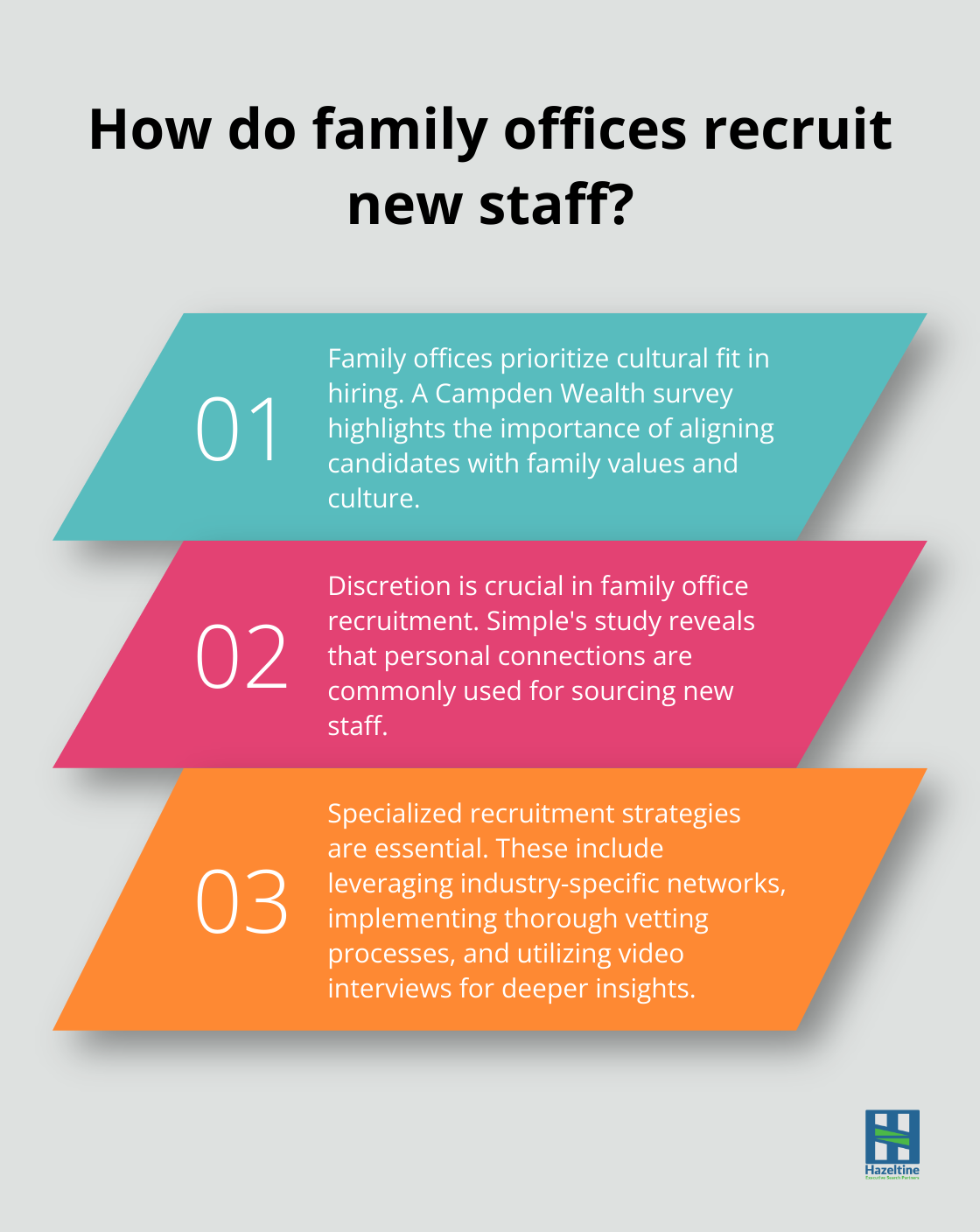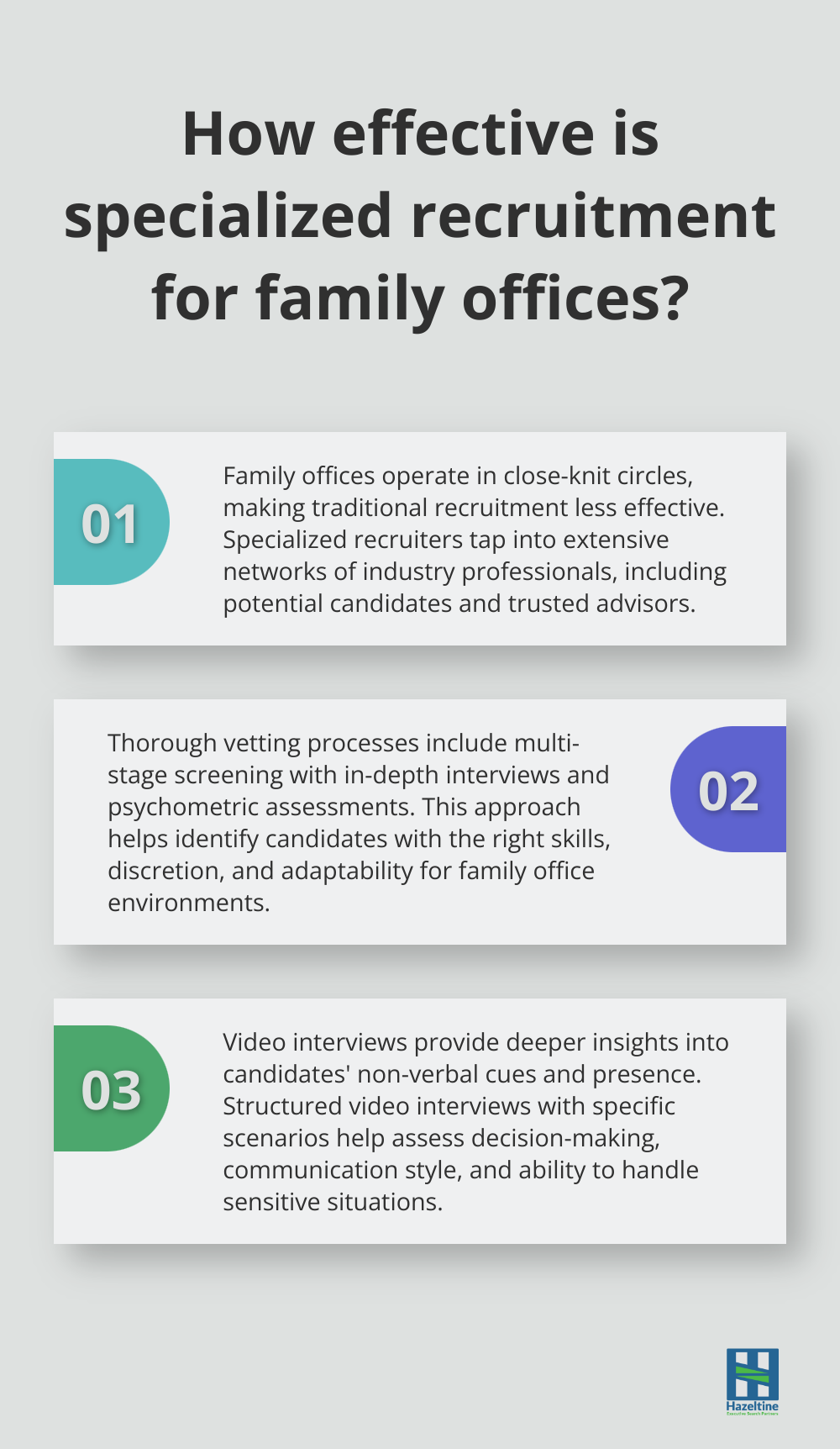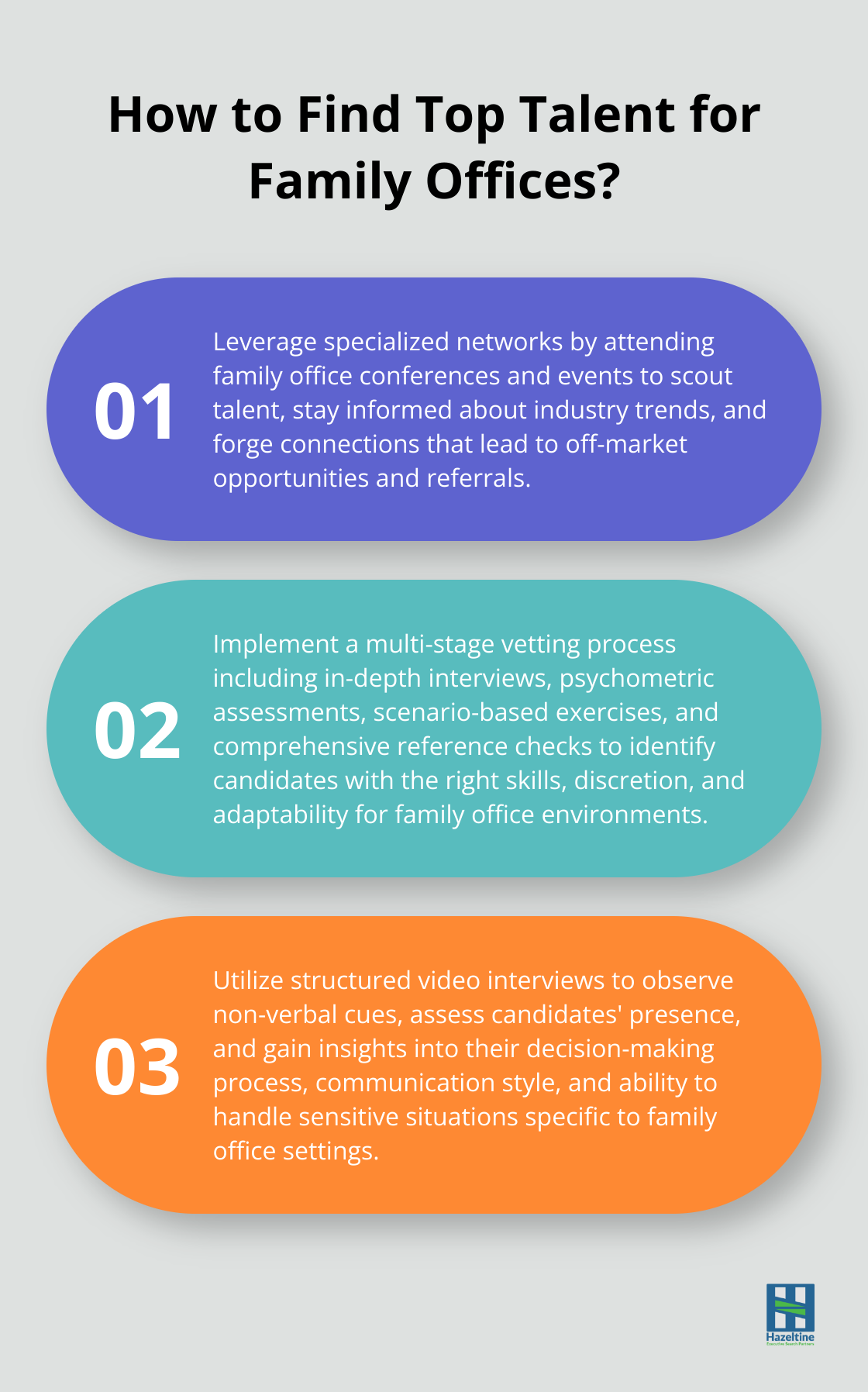What Are Family Offices?
Family offices are private wealth management firms that serve ultra-high-net-worth individuals and their families. These organizations come in two main types: single-family offices (SFOs) and multi-family offices (MFOs). SFOs cater exclusively to one family, while MFOs serve multiple families, often with shared interests or investment goals. These organizations require specialized talent and this blog explores the challenges and effective strategies in finding the right leaders for these distinctive institutions.
The Unique Structure of Family Offices
Family offices stand out due to their bespoke nature. Unlike traditional financial institutions, they adapt to meet the specific needs and objectives of the families they serve. This customization extends to their organizational structure, investment strategies, and service offerings.

A key feature of family offices is their holistic approach to wealth management. They don’t just handle investments; they often manage everything from tax planning and philanthropy to succession planning and lifestyle management. This comprehensive service model requires a diverse team of professionals with specialized skills.
Critical Roles in Family Office Operations
The success of a family office depends on the expertise of its key personnel. At the helm is typically a Chief Executive Officer (CEO) or Managing Director, who oversees all operations and maintains the family’s vision.
A Chief Investment Officer (CIO) develops and executes investment strategies. Given that private equity now constitutes a significant portion of average family office portfolios, CIOs must possess a strong background in alternative investments.
Family offices also need skilled Chief Financial Officers (CFOs) to manage financial reporting, budgeting, and tax planning. With family offices implementing technology strategies, roles like Chief Technology Officer (CTO) have become increasingly important.
Legal counsel is another critical position, especially considering the cybersecurity threats faced by organizations. These professionals help navigate complex legal landscapes and protect family interests.
Evolving Roles and Responsibilities
The demand for professionals who can wear multiple hats continues to grow. For instance, a CFO might also oversee risk management, or a CIO might lead sustainability initiatives.
Understanding these roles and the unique structure of family offices is essential for effective executive recruitment in this sector. It requires a nuanced approach that goes beyond matching skills to job descriptions, focusing instead on finding individuals who can thrive in this distinctive environment.
As we move forward, we’ll explore the specific challenges that arise when recruiting executives for family offices. These challenges stem from the unique nature of these organizations and require specialized strategies to overcome.
Overcoming Family Office Recruitment Hurdles
The Cultural Fit Conundrum
Family office recruitment presents unique challenges that extend beyond traditional corporate hiring. The distinctive nature of these organizations demands a nuanced approach to talent acquisition. Finding candidates with the right technical skills is only half the battle. The real challenge lies in identifying individuals who can seamlessly integrate into the family’s culture and values. A survey by Campden Wealth reveals insights into the characteristics of family offices, including the importance of cultural fit in hiring new talent.

Successful candidates often possess a strong service mentality. This quality enables them to navigate the delicate balance between professional expertise and personal rapport with family members. To assess cultural fit, we recommend incorporating behavioral interviews and personality assessments into the recruitment process.
Maintaining Discretion in a Connected World
Confidentiality is paramount in family office operations. The need for discretion extends to the recruitment process itself, where even the existence of an open position can be sensitive information. This requirement for secrecy can significantly limit the candidate pool and complicate the search process.
To address this challenge, family offices often rely on word-of-mouth referrals and trusted networks. A study by Simple found that family offices use various methods for sourcing new staff, including personal connections. However, this approach can limit diversity and fresh perspectives. We suggest leveraging specialized executive search firms that understand the need for discretion while accessing a broader talent pool.
Navigating Complex Family Dynamics
The most intricate aspect of family office recruitment is understanding and adapting to complex family dynamics. Each family office has its unique power structures, decision-making processes, and interpersonal relationships that can significantly impact the role of an executive.
Candidates must demonstrate not only their professional capabilities but also their ability to navigate these intricate family relationships. This often requires a level of emotional intelligence and diplomacy that goes beyond typical corporate environments.
To effectively assess a candidate’s ability to thrive in this environment, we recommend incorporating scenario-based interviews. These can provide insights into how a potential executive might handle sensitive family situations or conflicting priorities among family members.
Moreover, it’s important to be transparent about the family dynamics during the recruitment process. While maintaining confidentiality, providing candidates with a realistic preview of the working environment can help ensure a better fit and reduce turnover in the long run.
Specialized Recruitment Strategies
Given the unique challenges of family office recruitment, specialized strategies are essential. These may include:
- Leveraging industry-specific networks (which can provide access to candidates with relevant experience)
- Implementing thorough vetting processes (to ensure both technical competence and cultural fit)
- Utilizing video interviews for deeper candidate insights
Firms that specialize in family office recruitment can provide valuable expertise in navigating these challenges. Their industry-specific knowledge and tailored approach can significantly enhance the recruitment process.
As we move forward, we’ll explore effective strategies for family office executive recruitment that address these unique challenges and help ensure successful placements.
Mastering Family Office Executive Recruitment
Leveraging Specialized Networks
Family offices operate in close-knit circles, which makes traditional recruitment methods less effective. We tap into our extensive network of industry professionals, built over years of specialized recruitment. This network includes potential candidates, trusted advisors, industry experts, and family office associations.

We attend family office conferences and events regularly. These gatherings serve a dual purpose: they allow us to scout talent and stay informed about industry trends. The connections we forge often lead to off-market opportunities and referrals that standard job postings can’t access.
Implementing Thorough Vetting Processes
The high stakes and confidential nature of family office roles demand a rigorous vetting process. Our multi-stage screening includes:
- In-depth interviews that focus on technical skills and cultural fit
- Psychometric assessments to evaluate personality traits and working styles
- Scenario-based exercises to assess problem-solving abilities in family office contexts
- Comprehensive reference checks (including off-list references)
This approach helps us identify candidates who possess the right skills, discretion, and adaptability required in family office environments.
Utilizing Video Interviews for Deeper Insights
Video interviews have become an invaluable tool in our recruitment process. They allow us to observe non-verbal cues and assess a candidate’s presence (which is vital for roles involving frequent interaction with family members).
We use a structured video interview format. Candidates respond to specific scenarios they might encounter in a family office setting. This method provides insights into their decision-making process, communication style, and ability to handle sensitive situations.
Building Long-Term Relationships
Successful family office recruitment extends beyond filling a position. We take a long-term view and maintain contact with both placed executives and family offices after the initial placement.
This ongoing relationship allows us to provide support during the onboarding process and beyond. It also helps us understand the evolving needs of family offices, which enables more accurate matches in the future.
At Hazeltine Executive Search, we address the unique challenges of this sector through our approach to family office executive search. We combine industry-specific networks, thorough vetting, innovative interview techniques, and long-term relationship building to connect family offices with executives who have the right skills and fit seamlessly into the family’s culture and vision.
Final Thoughts
Executive family office recruitment presents unique challenges that require specialized strategies and deep industry knowledge. The distinctive nature of family offices demands a nuanced approach to talent acquisition, balancing technical expertise with cultural fit. Confidentiality, discretion, and the ability to navigate complex family dynamics are paramount in this sector.

Effective recruitment strategies for family offices include leveraging industry-specific networks, implementing thorough vetting processes, and utilizing video interviews for deeper candidate insights. These methods help identify executives who possess not only the required skills but also the adaptability and emotional intelligence to thrive in family office environments. The importance of partnering with specialized recruitment firms cannot be overstated.
We understand the intricacies of family office structures and the unique demands placed on executives in these roles. Our tailored approach, combining industry expertise with innovative recruitment techniques, ensures that family offices connect with leaders who align with both their professional requirements and cultural values (while navigating the evolving landscape of talent acquisition in this sector).


